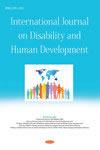Validation of the family needs assessment scale for Colombian families with children with intellectual disability
International Journal on Disability and Human Development
Pub Date : 2017-08-28
DOI:10.1515/ijdhd-2016-0033
引用次数: 5
Abstract
Abstract This study documents the development and validation of the children’s version of the Family Needs Assessment (FNA) instrument for Colombia. The FNA is a scale that evaluates the needs of families with children with disabilities who are below the age of 18 years. To validate this scale, the research team identified the theoretical background regarding family members’ needs and performed a linguistic adaptation of the scale, which was reviewed to guarantee its validity through cognitive interviews and a pilot study. Results from the exploratory factor analysis (EFA) showed 72 items distributed in a 4-factor solution. Cronbach’s alpha coefficients for each factor and for the overall FNA scale were also estimated. Specifically, alpha computed from the correlation among the 72 items was 0.97 and ranged from 0.85 to 0.95 for the four factors. Findings from this study provided evidence to support the validity of the FNA for families with children with intellectual disability in Colombia. The findings also indicated that the FNA has the potential of contributing to a better understanding of inputs (e.g. needs of families with individuals with disability) with the aim of informing system decisions, enhancing policies, improving services and strengthening family-professional partnerships.哥伦比亚有智力残疾儿童家庭的家庭需求评估量表的验证
摘要本研究记录了哥伦比亚儿童版家庭需求评估(FNA)工具的开发和验证。FNA是一种评估有18岁以下残疾儿童家庭需求的量表。为了验证该量表的有效性,本研究小组明确了家庭成员需求的理论背景,并对该量表进行了语言改编,并通过认知访谈和试点研究对其进行了审查,以保证其有效性。探索性因子分析(EFA)结果显示,72个项目分布在4因子溶液中。对每个因子和整体FNA量表的Cronbach alpha系数也进行了估计。具体而言,从72个项目之间的相关性计算出的alpha为0.97,四个因素的相关性范围为0.85至0.95。本研究的结果为支持FNA对哥伦比亚有智力残疾儿童的家庭的有效性提供了证据。调查结果还表明,FNA有可能有助于更好地了解投入(例如有残疾人的家庭的需要),目的是为系统决策提供信息、加强政策、改善服务和加强家庭-专业伙伴关系。
本文章由计算机程序翻译,如有差异,请以英文原文为准。
求助全文
约1分钟内获得全文
求助全文

 求助内容:
求助内容: 应助结果提醒方式:
应助结果提醒方式:


